
Beginner Read Search Engine Optimisation
This article provides an overview of what Search Engine Optimisation (SEO) is, how it works, and how it can benefit your organisation.
In this article
In my role as the Tech Champion for Search Engine Optimisation (SEO), I have helped many organisations to improve the visibility of their websites on Google Search Results Page (SERP). What soon became apparent, was that when it comes to SEO, cultural organisations have a very specific set of challenges and opportunities. This resource concentrates on tips and ideas particularly suited to organisations within the creative and cultural sector.
When done well, SEO will result in your website showing at the top of Google search results, when people search for something relevant to what you offer. This might include them searching for events, theatre shows, screenings, trying to find a museum or a gallery, or just trying to find information or answer to a question they have. Whatever it is, if it’s on your website and they are searching for it, you want Google to suggest your page in response to their query.
The aim of this resource is not to discuss what SEO is, how it works, and its main components. If you would like to learn more about SEO in general, we have these resources that you might find helpful.
Written resource: What is Search Engine Optimisation?
Webinar: Demystifying SEO: Actionable approaches for the cultural sector
Webinar: SEO explained in one hour
What we will concentrate on in this resource, is looking at how SEO can help solve specific issues faced by creative and cultural organisations in their digital marketing.
There are several technical requirements your website needs to meet. This is to make sure that your website is easily accessible and user-friendly to all visitors.
If you have several different types of events, you might want to be more specific:
There are some useful resources on Digital Culture Network’s Knowledge Hub that you might find helpful:
Article: Testing and improving your website structure and content. (It comes with a handy example card sorting session for you to try.)
In the early days of Google, the search results page (SERP) looked rather boring. You would see: the search box, some paid results at the very top, and the rest of the results (we call them “organic” as they weren’t the result of advertising but of SEO efforts) were listed in the form of blue hyperlinks with a little bit of text underneath. (We call this text “meta description”).
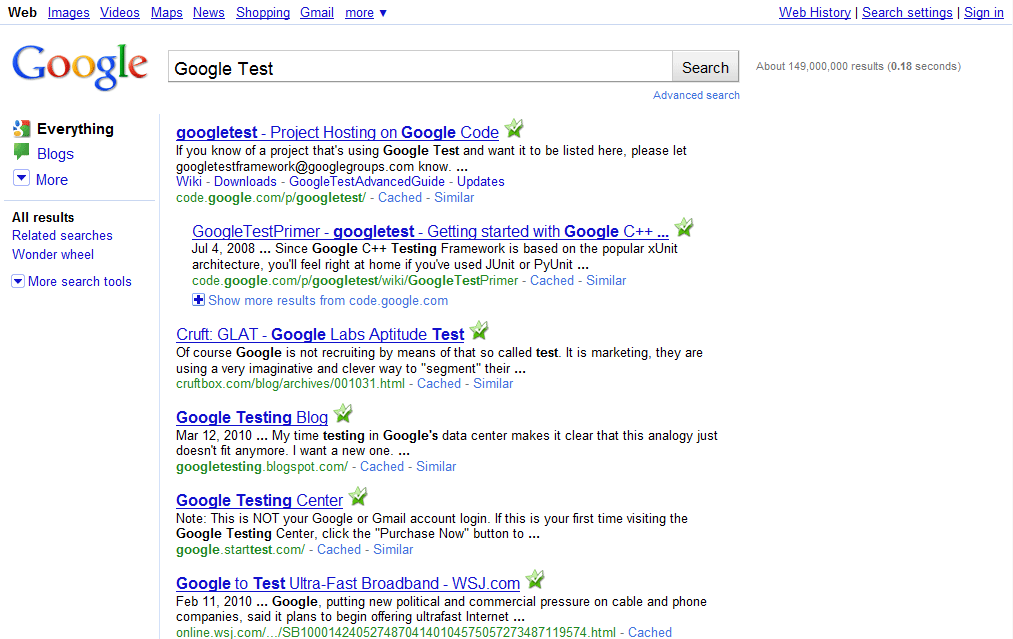
Nowadays, when you search for anything in Google, you will be met with an array of different results, often accompanied with images. We call those Rich Results. They are also sometimes referred to as “position zero” as they appear above the regular results. Getting listed among those results helps you stand out and may result in more people visiting your website.
Another major change from the original Google SERP is the presence of localised results. In the old days, if I wanted to check what is on in the cinemas near me, I would have to make a list of all of the cinemas in my locality and then go to their websites to see what films they are currently showing.
If I need to do this now, I can just go to Google and type in “movies near me” and have all of them listed right on the results page. This is good because:
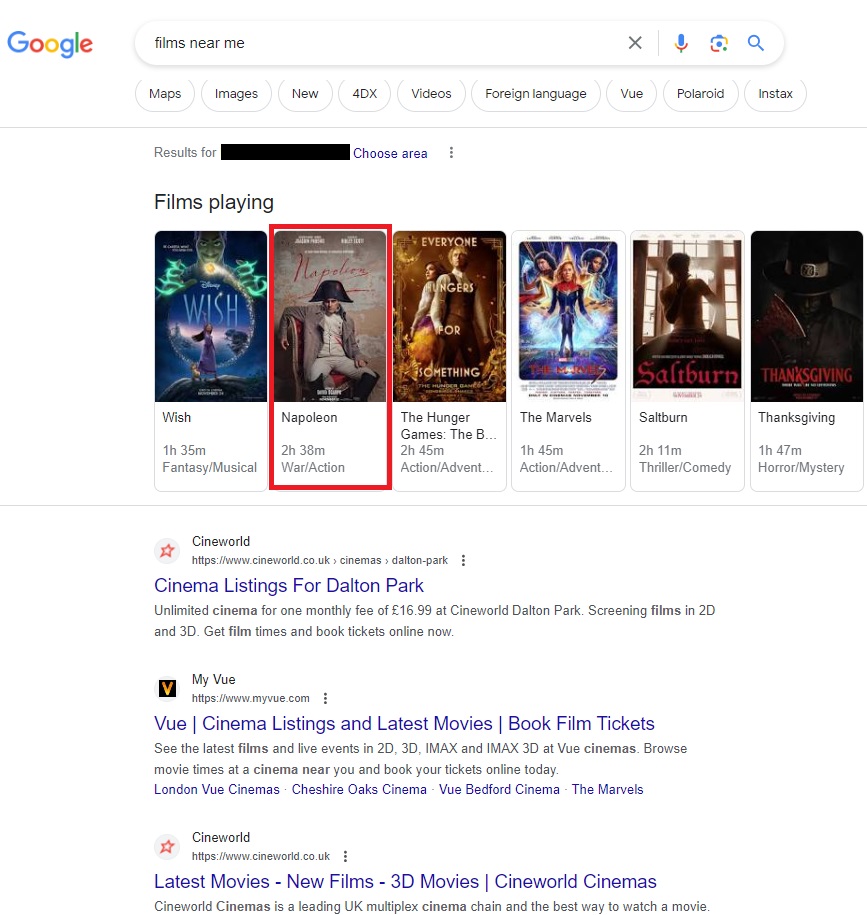
I can then click on the film I want to watch and see all of the cinemas showing that film with screening times.
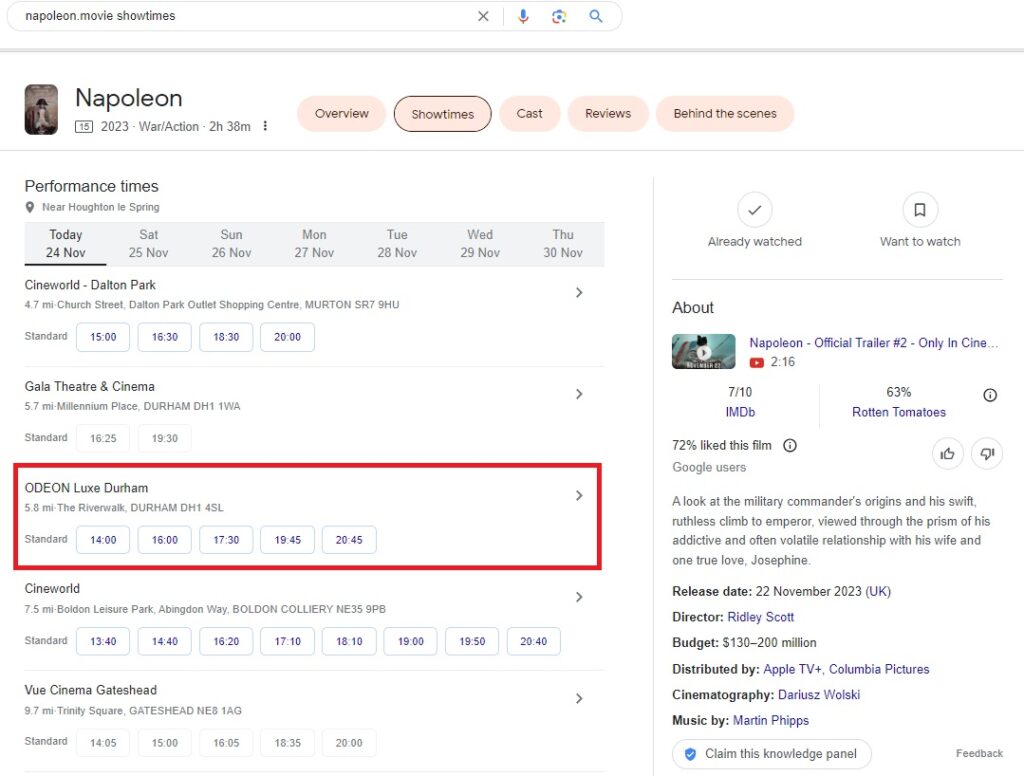
Once I’ve picked the screening I want to attend, I can click on the result and either book a ticket directly from the results page or get taken to the booking page of the cinema’s website – completely bypassing the main section of their site.
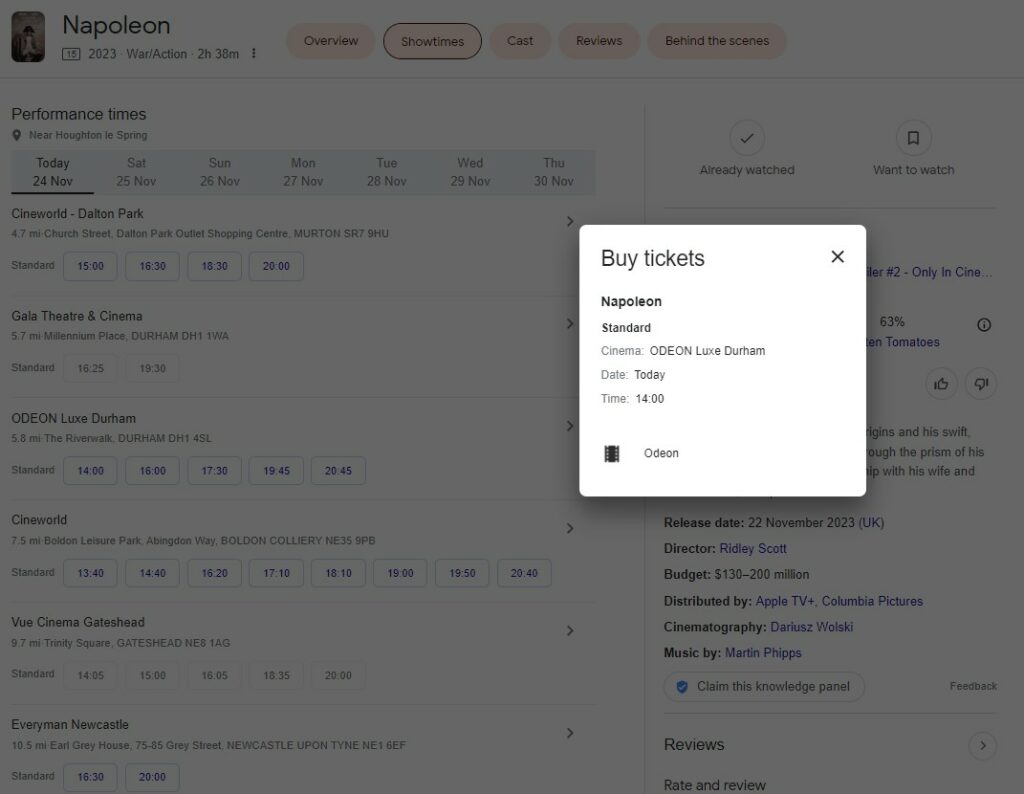
You will find similar types of results for theatre plays, comedy nights, or even when you search for things like “writing events near me.”
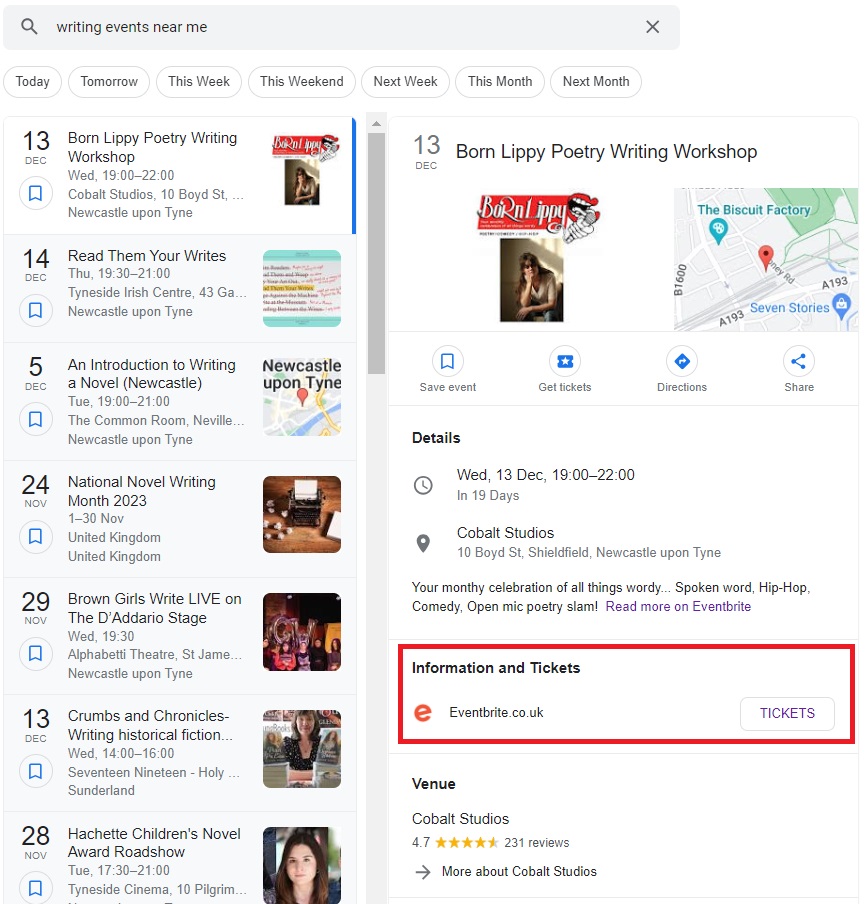
Localised results are also great for when you are looking for other attractions nearby, such as: museums, galleries, or music venues.
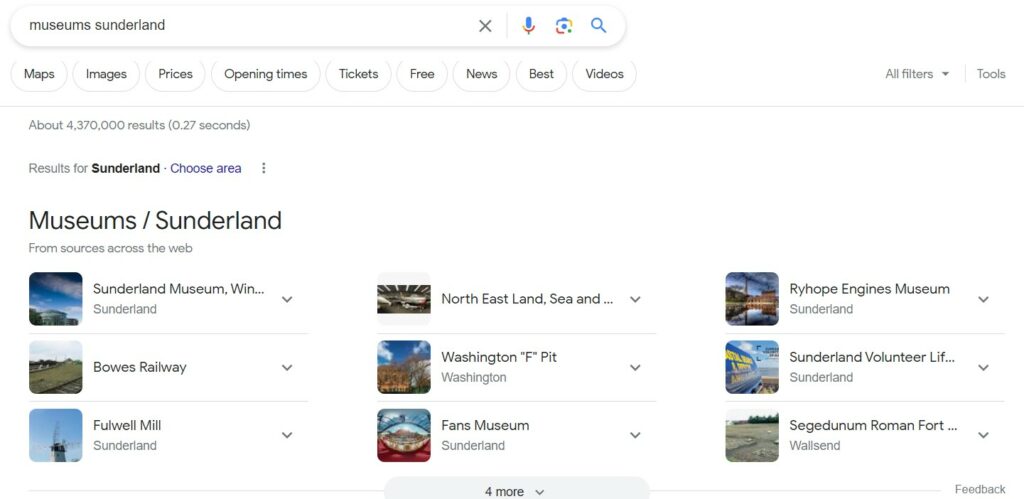
Even with exciting new features like enhanced localised results, the majority of searches on the internet are still by people who are just looking for information or answers to their queries. Examples could include:
(Following an accepted convention, keywords in this resource are lowercase.)
Answers to queries as the ones above can show as a Rich Result. When it does, it’s predominantly in two places:
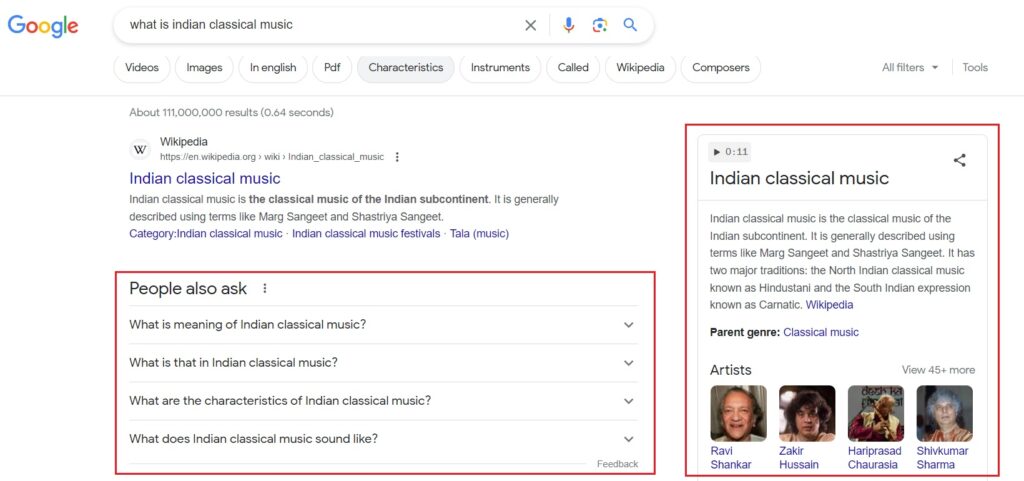
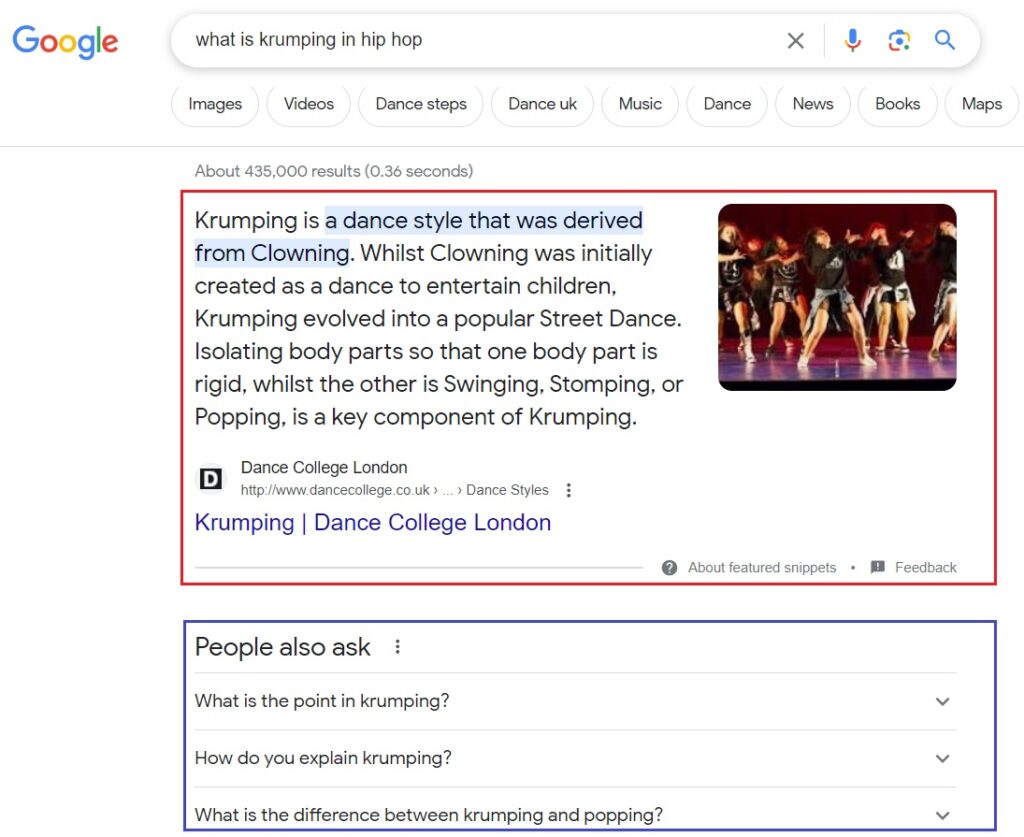
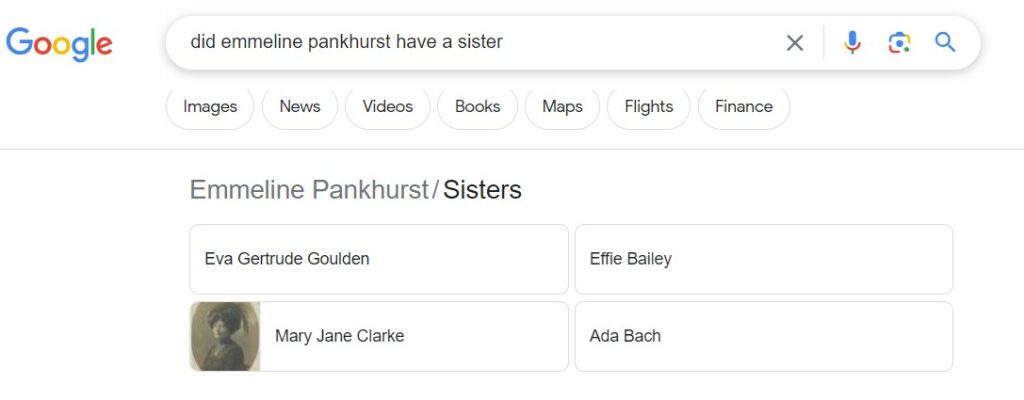
However, the majority of the results show above, will also show as regular website listings with a hyperlinked title and a meta description underneath.
Pages that appear as those ‘classic-looking’ results are content pages – pages on your website that people will visit having performed a search on Google. Unlike the events, which tend to show in rich results, these pages contain what SEOs refer to as “evergreen content”.
Evergreen content is a type of content that is not likely to ever go out of date. It is not likely that the information on whether Emmeline Pankhurst had a sister will ever change. You can update these pages, add more content to them, add and remove links (for example if you were promoting an event on that page and the event has passed), but the page itself will not lose its currency.
Having discussed the various types for Google results, let’s have a look at how that knowledge can be applied to real-life challenges, cultural organisations tend to face.
In order to promote ticket sales and sign-ups, it is absolutely crucial that your event shows up in localised rich listings for search near your locations.
As with everything in SEO, you can never guarantee success, but following these steps is likely to improve your chances:
Make sure you have your Google Business Profile set up and well-optimised. (DCN has a handy “How to use Google Business Profile – 2023 Guide” to help you with that.) If it’s practical, you can also publish your events there.
To better understand the content, Google pays attention to where on the website this content was published. Make sure that the category describes the content.
Firstly, if you are publishing information about the events you are holding, make sure that you publish it in the section of the website labelled as “events” or “what’s on”. This name should be reflected in your page address (URL) structure:
www.yourdomain.co.uk/events/name-of -your-event OR:
www.yourdomain.co.uk/whats-on/name-of -your-event
Secondly, make sure that what you include in your URL is useful and informative to your users – will the visitor to your website benefit from this information? Will it help Google understand what your content is about?
For example, this URL will help neither the user not Google to figure out what the content is:
www.yourdomain.co.uk/its-a-hoot
But these ones will:
www.yourdomain.co.uk/events/its-a-hoot-comedy-night-joe-blogs
www.yourdomian.co.uk/events/comedy-nights/its-a-hoot-joe-blogs
You would use the latter if you held lots of comedy nights (so they needed a separate page: www.yourdomain.co.uk/comedy-nights ) and “It’s a Hoot” was one of many.
Also, try to include a keyword in the URL. A good keyword would be something that people are likely to type into Google and that most accurately describes the event. In the above examples, people might search for “comedy nights” or “joe bloggs” (our hypothetical comedian). Unless it’s a hugely popular comedy show, few people are likely to search for “it’s a hoot”.
I discuss keywords in greater detail in my webinar: “Demystifying SEO: Actionable approaches for the cultural sector”.
Structured data is a piece of code added to your website that helps search engines better understand the type of content it is. Tagging your events as “event” will help Google categorise it correctly.
You can ask your developers to add structured data to your events. If your website is built on WordPress, All In One SEO plugin (AIOSEO) has that functionality in its paid version. Its main competitor, Yoast SEO, does not have this functionality as yet (November 2023).
This last piece of advice might not be suitable for all organisations, but it is generally a good idea to publish your event on reputable external event and ticketing sites. Google has confirmed that to gain more information about events available in a particular geographical location they pull information from other well-known websites such as Eventbrite and Ticketmaster. If you want to stand a better chance of your event listed in the localised rich listings, putting your event on these sites might give you the all-important boost.
Getting a first-time visitor to pay for a membership is not easy, although it is possible if you can attract people who are really interested in, and passionate about, what your organisation does.
From an SEO perspective, the best way to attract such motivated people is to produce content that they will find engaging. Museums, galleries, and libraries (especially if they are subject-specific, like The Old Operating Theatre (museum), Northern Print (gallery), or Wellcome (Library) are particularly well-placed to implement this strategy. These organisations are by definition subject matter experts.
A good strategy would be to regularly publish articles on more in-depth topics that would appeal to a more knowledgeable reader. All of these article pages should include the membership offer and link, as well as an incentive to sign up to a newsletter. This will allow the organisation to nurture this relationship in the hope that – if the visitor did not subscribe immediately – they will do so later.
This strategy, however, will only work if the content is search engine optimised. This would include carrying out keyword research to find what your visitors might be interested in and what they are likely to type into Google to find information they are looking for.
For example, The Old Operating Theatre does a very good job when it comes to creating content to attract users interested in the subject of historical surgery. Their blog talks about interesting and often not-well-known aspects of early surgery. Their article: For the Good of the Living: Dissection and Medical Education in the 19th Century, ranks in position 1 for the keyword “dissection in the 19th century”.
Once you have decided on your keyword (in the case of the Old Operating Theatre’s blog post, it would be “dissection 19th century”) here are the recommended next steps:
Looking at the example above, the keyword “dissection 19th century” is included in the URL: https://oldoperatingtheatre.com/for-the-good-of-the-living-dissection-and-medical-education-in-the-19th-century/
However, when we look at another example – this time an article on the Wellcome Collection website, we can see there is room for improvement. The current URL, https://wellcomecollection.org/articles/ZSleuhAAACEAoIj7 could be improved by adding a keyword to it (for example: neuroqueer comics): https://wellcomecollection.org/articles/neuroqueer-comics
This has been done well in both examples we looked at:
For the Good of the Living: Dissection and Medical Education in the 19th Century
The Wellcome Collection article is entitled “Neuroqueering comics”, which is great. The keywords “neuroqueering”, “neuroqueerness”, and “neuroqueer” are closely related and can function as one.
This is done really well in the below example (highlights mine):
Researcher and zine-maker Lea Cooper considers how comic-zines use the distinctive qualities of zines, such as their modes of production and distribution, to explore some of the complex connections between memory, autobiography, disability and neuroqueerness. Neuroqueering brings neurodivergence and queering together and is a way of subverting and disrupting norms around both how human minds work, and gender and sexuality.
The Old Operating Theatre article could be improved. The first paragraph mentions the word “dissection” but not “19th century”.
Much of our knowledge of the organs inside the human body has developed from the dissection of dead human bodies, a practice that was first developed in Europe by ancient Greek physicians in the 3rd century BC. Dissection then fell out of use in the West until the Renaissance, when its revival led to significant advancements in our understanding of human anatomy and medicine. However, for many centuries, the anatomists’ dissection room was greatly feared, and in some cultures, the dissection of human bodies remains prohibited.
As we have already learned, meta description is the little snippet of text shown under the webpage link in Google search results. You can edit it in the admin side of your website (for example with an SEO plugin like AIOSEO or Yoast to do this in WordPress).
Google will not always use the meta description you created, but it’s a good practice to write one that includes your main keyword. A good meta description should provide succinct information on what you will encounter when you visit the page, thereby promoting click-through-rate and lowering the bounce rate. It should not exceed 160 characters with spaces.
The way to promote activities like workshops and classes is a combination of the strategies listed above. A lot would depend on the audience you are trying to reach.
If it’s an advanced workshop, then your audience would consist of people with deep interest in the subject, and therefore you would follow a similar approach to one suggested for memberships and subscriptions.
If it’s more of an open activity where all are welcome, then you would still try to optimise your content for appropriate keywords and try to support it with evergreen articles on the similar topic.
Make sure that the page about the event is well-optimised (see above) and contains all of the information that your visitor would like to know, supported by other media like images and videos – making the content more digestible.
Since it’s a time-bound event, it is also crucial that you appear in the localised rich results.
Organisation often come to me asking if SEO could help them in increasing their shop sales or venue hire enquiries. SEO is not the obvious go-to-solution to achieve these goals.
For shops, the problem is twofold:
One, items sold there tend to be quirky and unusual. For SEO to work, people need to be aware of the product in order to search for it. No searches – no traffic, irrespective of how well you would normally rank in search results. Unusual and bespoke events suffer from the same problem.
The second issue is often down to price and mostly affects books. If I have just visited a museum or an art gallery and I’m leaving via a shop, I am likely to purchase a book on the subject. It would be a nice way to round off a pleasant day out and I’m unlikely to check whether I could get the book cheaper online.
However, if I’m already online, and I can see that the same book is cheaper on Amazon, I’m not likely to buy it from the museum shop.
When it comes to venue hire, the problem is competition. Most venues in your local area will try to rank for these very competitive keywords, so unless you’re huge and very well-known, you don’t really stand a chance.
If your SEO is good, resulting in a lot of people visiting your website, you can funnel them into sections that are otherwise difficult to promote in Google search. If I am already on a museum website reading an article, I might be in the right frame of mind to spend some money on something quirky related to my field of interest. If you feature such products on the article page, I might be persuaded to make a purchase.
When it comes to promoting venue hire, organisations often ask me how to rank for searches like: “best quirky wedding venues”, “best christmas party venues ”, etc.
When you type these phrases into Google, what you will find is a selection of articles, usually from websites like: TimeOut, interest sites, or local media. The likelihood that your content will ever outrank them is slim. A much better strategy would be to contact them and ask if they would include your quirky and unusual event, wedding venue, or potential presents in their list-article that already ranks for the keyword you target. If you can’t beat them (and you likely can’t), why don’t you try to join them?
This resource would not be complete if I didn’t address two issues that seem to come up frequently when speaking to creative and cultural organisations.
This is a common problem. Each event has a page. Then the event is over, what do we do with the page?
I generally believe that it’s better to keep these pages, even if you move them to a “past events” section on your website. The crucial issue here is whether this page ranks in Google. I have seen pages rank really well, for high-traffic keywords, and when I pointed them out to the organisation, they were confused. It seems that this was a page about an exhibitor / artist from an event long passed. They didn’t even remember the page existed. But it did. And it got lots of eyes on it.
You can capitalise on this traffic by not deleting the page but making sure it clearly states that the event has passed, or that this exhibitor / artist information is from three years ago. At the same time, you can try to funnel these visitors to other parts of your website. Why don’t you say “this event ended in May, but come and visit our What’s On page,” and get them interested in other things you offer?
Websites in the cultural sector tend to contain many images. This is great. Images enhance your content, get users engaged and they can also rank separately in Google Image Search.
For example, Green Howards Museum doesn’t rank at the top of the main Google search for “crimean war soldier” but when you look at Google Images, they are one of the top results.
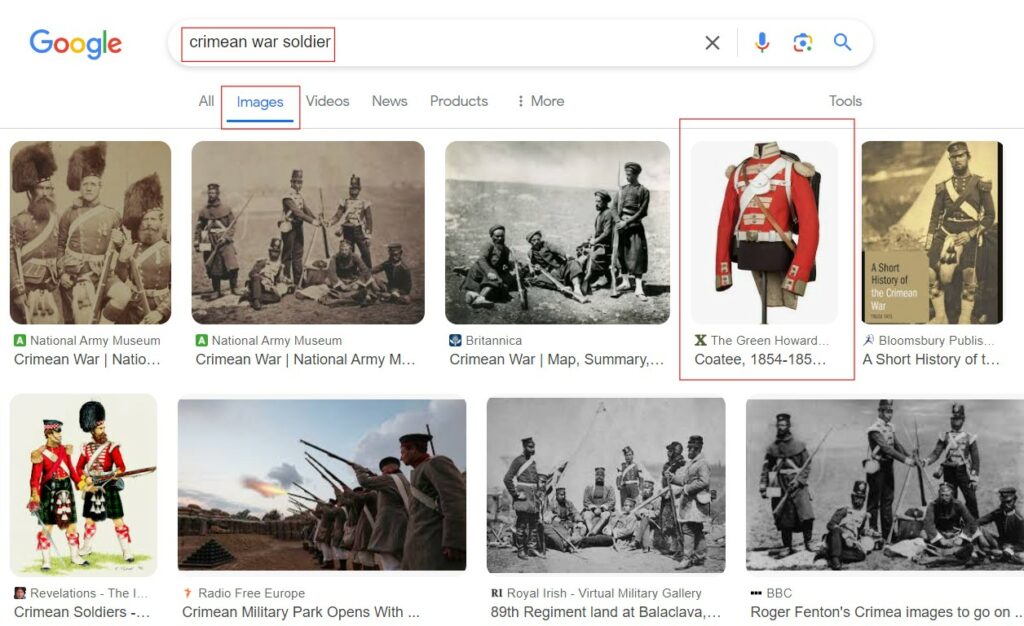
However, there are some things that you need to remember:
You want your website to be fast and compliant with Google’s Core Web Vitals. Very large images considerably slow down the website, so try to compress them as much as possible – without loss of quality. Having said that, you really don’t need print-quality images on your website. Smaller ones will do .
There are several things you can do to make your images more Google-friendly.
-Make the file name descriptive (include keywords if appropriate)
-Add an alt-tag to all images that are not purely decorative.
-Add a caption where appropriate
This resource outlined some of the commonly used ideas to help creative and cultural organisations improve their website SEO. However, it is important to remember that every organisation or individual working in this sector is different and might need tailored advice.
The Digital Culture Network is here to support you and your organisation. Our Tech Champions can provide free one-to-one support to all arts and cultural organisations and individuals who are in receipt of, or eligible for, Arts Council England funding. If you need help or would like to chat with us about any of the advice we have covered above, please get in touch. Sign up to our newsletter below and follow us on X @ace_dcn for the latest updates.
Beginner Read Search Engine Optimisation
This article provides an overview of what Search Engine Optimisation (SEO) is, how it works, and how it can benefit your organisation.
Beginner Read Search Engine Optimisation
Search Engine Optimisation can be a valuable tool for boosting your organisation’s online presence. Read on to find out why.
This article is a best practice guide for creative and cultural organisations who want to manage and optimise their Google Business Profile.
Beginner Read Search Engine Optimisation
This article provides an overview of what Search Engine Optimisation (SEO) is, how it works, and how it can benefit your organisation.
Beginner Read Webinars Search Engine Optimisation
Discover practical approaches to SEO for the cultural sector, including increasing visibility and leveraging Google’s rich results.


